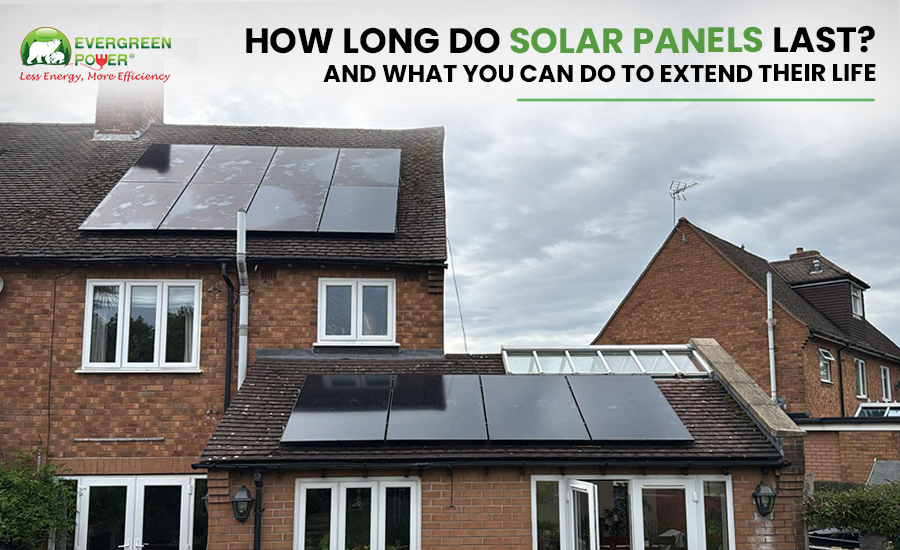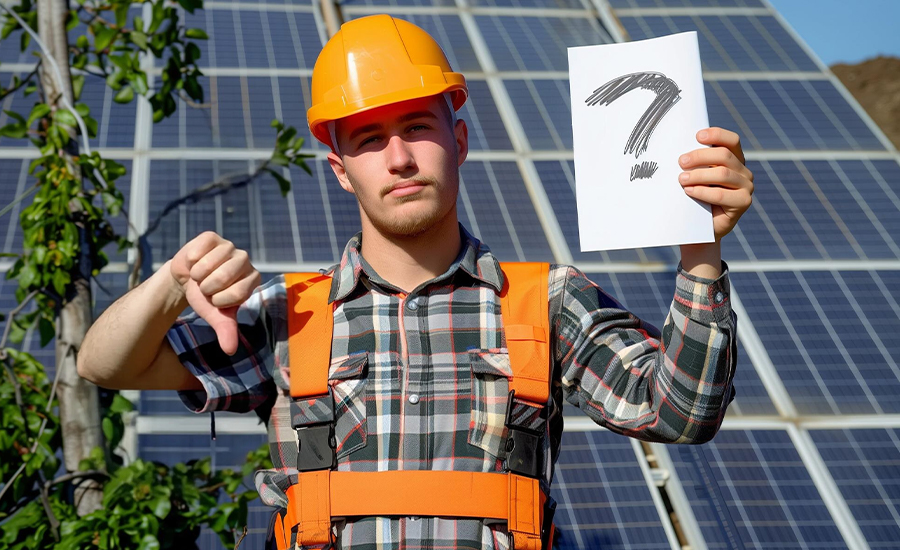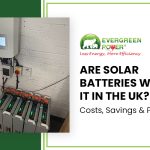
Summary: Solar Panels Last Longer Than You Think
Here’s the quick version:
- Panels typically last 25–30 years
- Most still produce energy beyond that just slightly less
- Regular cleaning, monitoring, and an inverter replacement can extend your system’s life
- Degradation is normal and factored into savings projections
- The UK climate is gentle on panels cloudy days aren’t a problem
How Long Do Solar Panels Last
“Alright, but how long are these things actually going to last?”
It’s a fair one. If you’re spending several thousand pounds on a solar setup, you want to know it’s not going to conk out in ten years. Good news: solar panels UK are surprisingly long-lasting. And with a little care, they’ll keep on generating power for decades.
Here’s the full story on solar panel lifespan — what affects it, how long you can expect your system to perform, and a few simple things you can do to keep it running smoothly
The Straight Answer: 25 to 30 Years (and Often More)
Most modern solar panels come with a performance guarantee that lasts 25 years — sometimes more. That doesn’t mean they suddenly stop working after that. It just means their efficiency might dip below a certain level, usually around 80–85% of their original output.
Many panels keep generating well into their 30s, just with slightly less Solar power than when they were brand new.
Example: A panel producing 450W in year 1 might produce around 400W in year 25.
That’s still plenty of usable electricity — especially when you’re not paying anything to generate it.
What’s Degradation, and Should You Worry?
In solar-speak, degradation means your panels produce a bit less energy each year. It’s totally normal — like tyres gradually wearing down or your Solar battery not holding a charge like it used to.
Most panels degrade by 0.5% per year. So, by year 10, you might see a 5% dip in output. That’s not huge, and it’s already factored into most return-on-investment calculations.
Some premium panels degrade even slower, thanks to better materials and build quality. If longevity’s a top priority, those might be worth the extra upfront spend.
UK Weather: Friend or Foe?

Actually, our mild climate helps more than it hurts. Contrary to popular belief, solar panels uk Costdon’t need blistering heat they work on light, not temperature. In fact, cooler temperatures help panels operate more efficiently. It’s extreme heat and intense UV that usually age them faster not an issue in most parts of the UK.
Can You Do Anything to Help Them Last Longer?
Definitely. While solar panels are mostly “fit and forget,” a bit of care goes a long way. Here’s what helps:
- Keep them clean – Once or twice in 5 years, check for bird droppings, dirt, or leaves. If you can’t safely reach your roof, a professional cleaning service is worth it.
- Monitor performance – Use your inverter or app to keep an eye on energy output. A sudden drop might mean a panel’s underperforming.
Trim nearby trees – Overhanging branches can cause shading or physical damage in storms
What About the Inverter?
Good question — the inverter doesn’t last as long as the panels.
Most inverters have a lifespan of 10–12 years, depending on the brand and usage. It’s the hardest-working part of the system, converting energy every second the sun is shining.
Plan for a replacement or upgrade about halfway through your solar system’s life. The good news? Inverters are far cheaper to replace than panels, and newer ones are more efficient.
What If a Panel Fails?

It’s rare, but it can happen — usually due to manufacturing defects or weather damage (hail, for example, though UK storms rarely get that intense).
Most panels come with:
- Product warranties (typically 20–25 years) covering defects
- Performance guarantees (25 years or more) covering output
If something does go wrong, reputable installers will handle the manufacturer claim for you. That’s why it’s always worth going with an MCS-certified installer like Evergreen Power.
Is Replacing Panels in 20–30 Years Worth It?
Depends. By the time your panels are nearing the end of their life, solar panel ground mount tech will likely be even more efficient and affordable.
You may choose to:
- Replace the full system with newer, more compact panels
- Add new panels alongside older ones if those panels are still around.
- Keep the old panels running if they’re still doing the job
In short: solar isn’t a short-term fix. It’s a long-term upgrade that’ll keep giving back year after year.
FAQs
How long do solar panels really last?
Most work for 25–30 years, and many keep going beyond that.
Do I need to replace my entire system eventually?
Not necessarily. You might just replace the inverter and keep the panels running.
How do I know if a panel has failed?
You’ll usually see a drop in output in your monitoring app or inverter display.
Is degradation worse in UK weather?
No in fact, the cooler, cloudier climate slows it down compared to hotter countries.
Written by: Kyler Walter

- Kyler Walter is a passionate advocate for renewable energy and sustainable living. As a leading voice at Evergreen Power UK, he specializes in solar energy solutions and has played a vital role in promoting innovative, eco-conscious technologies across the UK.
Latest entries
 SolarJanuary 19, 2026Are Solar Panels Worth It in the UK in 2026?
SolarJanuary 19, 2026Are Solar Panels Worth It in the UK in 2026? Solar BatteriesJanuary 9, 2026Why Combine Solar PV with Home Battery Storage? Practical benefits for UK homeowners
Solar BatteriesJanuary 9, 2026Why Combine Solar PV with Home Battery Storage? Practical benefits for UK homeowners Solar BatteriesDecember 4, 2025Are solar batteries worth it in the UK? Costs, savings & payback
Solar BatteriesDecember 4, 2025Are solar batteries worth it in the UK? Costs, savings & payback  SolarNovember 6, 2025Do solar panels work in winter in the UK? What to expect
SolarNovember 6, 2025Do solar panels work in winter in the UK? What to expect
 020 3793 7323
020 3793 7323


